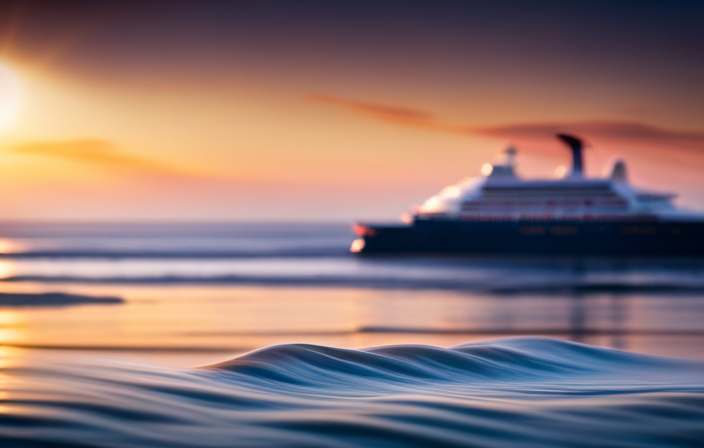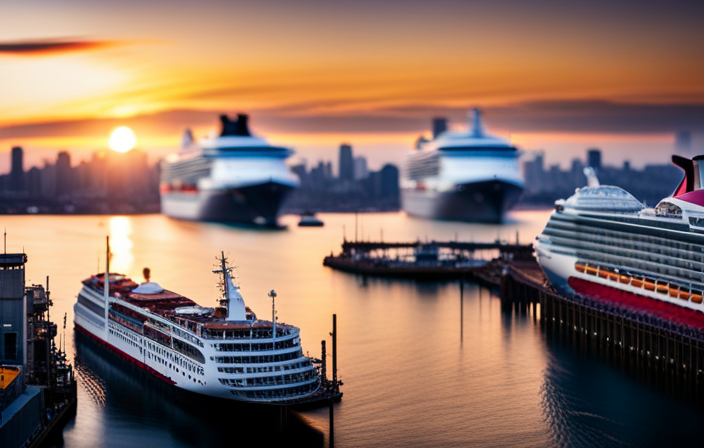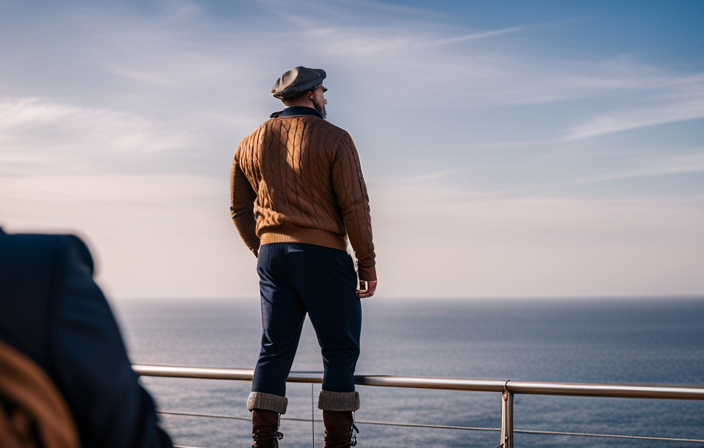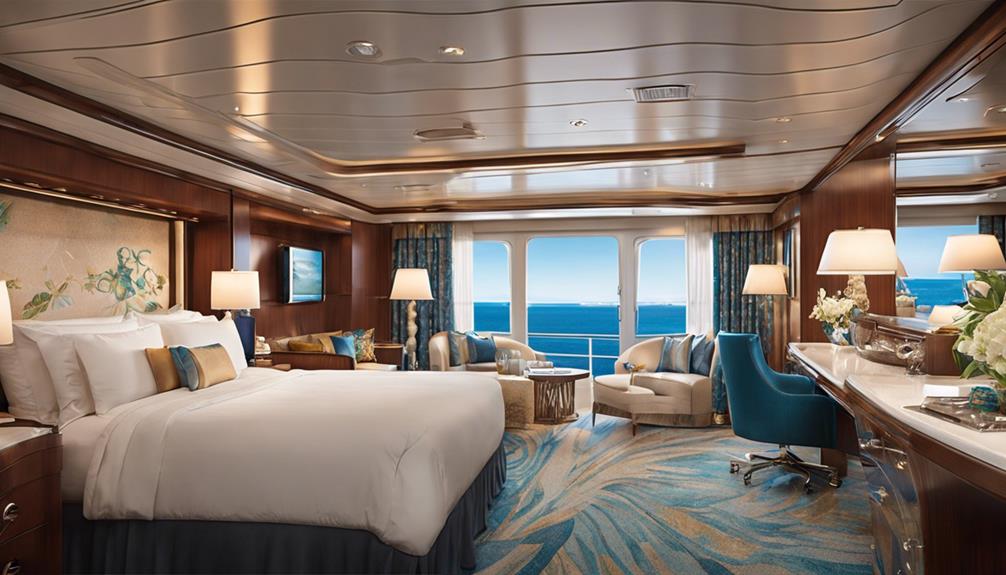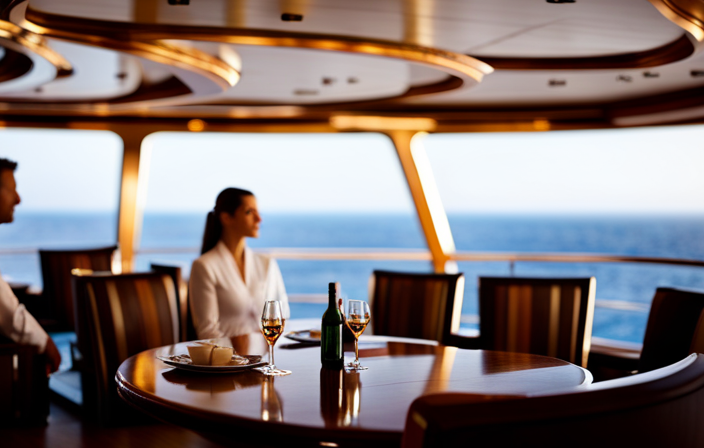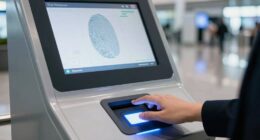Did you know that in 2019, the global cruise industry was valued at over $150 billion? This impressive figure highlights the widespread popularity of cruise vacations. However, the outbreak of the COVID-19 pandemic abruptly halted the industry, raising questions about when it will be safe to cruise again.
As an avid cruise enthusiast and someone who has closely followed the developments in the industry, I have been eagerly awaiting the answer to this question. In this article, I will explore the current state of the cruise industry, the vaccination requirements and health protocols in place, the collaboration with health authorities and experts, as well as the monitoring and screening measures that have been implemented.
Additionally, I will delve into the enhanced cleaning and sanitization procedures, social distancing and capacity limits, onboard medical facilities and staff, and shore excursion safety measures. By examining these factors, we can gain a better understanding of the future outlook for safe cruising.
Key Takeaways
- Virtual events provide a safe environment for passengers and allow for contact tracing measures in case of an outbreak.
- Onboard medical facilities and staff ensure passenger and crew health, with stringent training requirements and well-equipped facilities.
- Shore excursion safety measures are a priority, with thorough risk assessments, trained guides, and high safety standards.
- Future trends for safe cruising include advanced health screening measures, touchless check-ins, stringent cleaning protocols, and exploration of innovative ventilation systems for better air quality.
Current State of the Cruise Industry
The cruise industry’s current state is uncertain, with ships remaining docked and passengers eagerly awaiting the day when it’ll be safe to set sail again. The COVID-19 pandemic has dealt a severe blow to the industry, and its recovery is contingent upon various factors.
Aside from the obvious health concerns, there are also economic implications to consider. The cruise industry plays a significant role in supporting local economies, from port cities to tourist destinations. The absence of cruise ships has had a profound impact on businesses that rely on cruise tourism, such as hotels, restaurants, and souvenir shops.
The revival of the cruise industry will not only bring relief to eager travelers but also serve as a lifeline for these local economies. In order for cruise operations to resume safely, vaccination requirements and health protocols will need to be implemented.
Vaccination Requirements and Health Protocols
As we eagerly await the return of cruising, it’s crucial to consider the vaccination requirements and health protocols that will be in place. To ensure the safety of passengers and crew, cruise lines are likely to implement the following measures:
-
Vaccine passports: Cruise lines may require passengers to show proof of vaccination before embarking on a cruise. This will help create a protected and healthy environment onboard.
-
Travel restrictions: Depending on the destination, there may be specific travel restrictions in place. These restrictions could include quarantine requirements or mandatory testing before boarding the ship.
-
Enhanced health protocols: Cruise lines will continue to prioritize the health and safety of passengers through enhanced cleaning procedures, social distancing measures, and increased medical facilities onboard.
Considering these measures, it is evident that the cruise industry is taking the necessary steps to collaborate with health authorities and experts to ensure a safe and enjoyable cruising experience for all.
Collaboration with Health Authorities and Experts
Collaborating with health authorities and experts, cruise lines are actively working towards creating a seamless and enjoyable cruising experience. This collaboration poses various challenges, as it requires aligning the cruise industry’s operational expertise with the expertise of health professionals. The primary goal is to regain public trust and ensure the safety of passengers and crew members. To achieve this, cruise lines have established partnerships with renowned health organizations and experts, such as the World Health Organization and the Centers for Disease Control and Prevention. These collaborations involve regular communication, sharing of best practices, and implementing health protocols based on the latest scientific research. By working together, cruise lines and health authorities aim to develop comprehensive strategies that address the unique challenges presented by cruising. This collaboration is crucial as it lays the foundation for effective monitoring and screening measures, which will be discussed in the subsequent section.
Monitoring and Screening Measures
Passengers can expect enhanced health monitoring and screening measures to ensure a seamless and secure cruising experience. Cruise lines are investing in advanced monitoring technology to detect and prevent the spread of illnesses onboard.
Temperature screenings will be conducted prior to embarkation and throughout the voyage to identify any potential cases. Additionally, health questionnaires will be required to assess passengers’ health status before boarding. These measures are crucial in identifying and isolating any individuals who may pose a risk to others.
By implementing these proactive measures, cruise lines aim to create a safe environment for all passengers and crew members.
As we transition to discussing enhanced cleaning and sanitization procedures, it is important to recognize that these monitoring and screening measures are just the first step in ensuring a healthy and enjoyable cruising experience.
Enhanced Cleaning and Sanitization Procedures
Get ready for a sparkling clean ship as you step onboard, with enhanced cleaning and sanitization procedures ensuring a pristine environment throughout your entire voyage.
The cruise industry has implemented rigorous measures to combat the spread of germs and viruses, including the use of highly effective disinfectants. Surfaces that are frequently touched, such as handrails, elevator buttons, and door handles, are cleaned and disinfected multiple times a day.
In addition, high traffic areas like dining venues and entertainment spaces undergo regular deep cleaning. Crew members receive extensive training on proper cleaning techniques and are diligent in their efforts to maintain a hygienic environment.
These enhanced cleaning and sanitization procedures not only provide peace of mind but also contribute to the overall well-being of passengers.
As we move forward, it is important to consider the next aspect of cruise safety: air filtration and ventilation systems.
Air Filtration and Ventilation Systems
Breathe in the fresh, clean air as you step onboard, thanks to state-of-the-art air filtration and ventilation systems ensuring a healthy and comfortable environment throughout your entire voyage. Cruise ships are equipped with smart technology that continuously monitors and adjusts the air quality, providing an optimal experience for passengers. These advanced systems use high-efficiency particulate air (HEPA) filters to remove airborne particles, including viruses and bacteria, ensuring a high level of filtration effectiveness. The air is then circulated and refreshed multiple times per hour, creating a constant flow of clean air throughout the ship.
To give you a better idea of the effectiveness of these systems, take a look at the table below:
| Filtration System | Filtration Efficiency |
|---|---|
| HEPA Filters | Over 99.9% |
| Ventilation Rate | 20 air changes/hour |
As you can see, cruise ships are equipped with top-of-the-line air filtration and ventilation systems that prioritize your health and well-being. With these measures in place, you can rest assured that the air you breathe onboard is clean and safe. Moving forward, let’s discuss the next important topic of social distancing and capacity limits to ensure a safe cruising experience.
Social Distancing and Capacity Limits
Now that we have discussed the importance of air filtration and ventilation systems in ensuring a safe cruising experience, let’s turn our attention to another crucial aspect – social distancing and capacity limits.
As we navigate through these challenging times, it is imperative for cruise lines to implement strict protocols to minimize the risk of transmission onboard. This includes reducing passenger capacity to allow for adequate physical distancing, as well as enforcing guidelines for social interactions in public areas.
Additionally, many cruise lines have started organizing virtual events to provide entertainment while maintaining a safe environment. In the event of an outbreak, contact tracing measures can be employed to identify and isolate individuals who may have been exposed.
As we move forward, it is essential for cruise lines to strike a balance between maintaining an enjoyable experience for passengers and prioritizing their safety.
This brings us to the next section, where we will explore the onboard medical facilities and staff, who play a vital role in safeguarding the health and well-being of all passengers and crew members.
Onboard Medical Facilities and Staff
Onboard medical facilities and staff play a crucial role in ensuring the health and well-being of all passengers and crew members. The cruise industry has stringent training requirements for onboard medical staff. These requirements ensure that medical professionals are equipped with the necessary skills and knowledge to handle any medical situation that may arise during a cruise.
Cruise ships are also equipped with state-of-the-art medical equipment, including advanced diagnostic tools and medication supplies. This enables the medical staff to provide prompt and effective care to those in need. The presence of well-trained medical professionals and top-notch medical facilities onboard provides passengers with a sense of security and peace of mind.
With the assurance of quality medical care, passengers can truly relax and enjoy their cruise experience.
Shore Excursion Safety Measures
Shore excursion safety measures are of utmost importance to cruise lines. Thorough risk assessments and close collaboration with local authorities ensure that every excursion meets high safety standards. Trained guides are provided to handle emergencies and offer local knowledge. These precautions give passengers peace of mind during their adventures. As cruise lines continue to prioritize safety, these protocols will evolve to provide the safest experience possible.
Future Outlook for Safe Cruising
Imagine the exhilarating anticipation as you embark on your next cruise adventure, knowing that the future of safe cruising holds endless possibilities and thrilling experiences. The cruise industry is continuously adapting to ensure the well-being of passengers and instill customer confidence. Here are some future trends to look forward to:
-
Advanced health screening measures: Cruise lines are investing in advanced technologies like temperature checks, rapid testing, and touchless check-ins to minimize health risks.
-
Enhanced sanitation protocols: Stringent cleaning and disinfection measures will become the norm onboard, with increased frequency and focus on high-touch areas.
-
Innovative ventilation systems: Cruise ships are exploring new ventilation systems that improve air quality and reduce the risk of airborne transmission.
-
Increased flexibility and transparency: Cruise lines are offering flexible booking and cancellation policies, ensuring passengers feel secure and confident in their travel plans.
As the industry continues to prioritize safety, the future of cruising looks bright, promising unforgettable experiences while maintaining customer confidence.
Frequently Asked Questions
Are there any specific age restrictions for passengers on cruises?
There are usually no specific age restrictions for passengers on cruises, but safety measures such as life jacket fittings and emergency drills are mandatory for all passengers, regardless of age.
What is the process for booking and canceling a cruise during this time?
To book a cruise during this time, I would recommend checking with the cruise line for their current booking process. As for cancellation, it’s important to review the cruise line’s cancellation policy to understand any fees or penalties involved.
Will passengers be required to wear masks while onboard the cruise ship?
Passengers will likely be required to wear masks onboard cruise ships to mitigate the spread of the virus. The effectiveness of masks in preventing transmission can vary, but their enforcement is crucial for maintaining a safe environment.
Are there any specific guidelines for dining and food service on cruise ships?
Specific guidelines for dining and food service on cruise ships include reduced capacity, enhanced cleaning protocols, and the use of personal protective equipment. Safety protocols ensure a safe dining experience for passengers.
How will the cruise industry address the issue of crowded common areas onboard the ship?
To address the issue of crowded common areas onboard cruise ships, the cruise industry will implement social distancing measures and capacity restrictions. These measures will help ensure the safety and well-being of passengers while maintaining a comfortable and enjoyable experience.
Conclusion
In conclusion, as I gaze out at the vast ocean, I can’t help but feel a glimmer of hope for the future of cruising. The industry has made tremendous strides in implementing vaccination requirements, health protocols, and enhanced cleaning procedures.
With the collaboration of health authorities and experts, monitoring and screening measures have become more robust. Social distancing and capacity limits ensure a safer onboard experience. And the presence of well-equipped medical facilities and staff provide reassurance.
While the path ahead may still be uncertain, the horizon shines with the promise of safe cruising once again.

